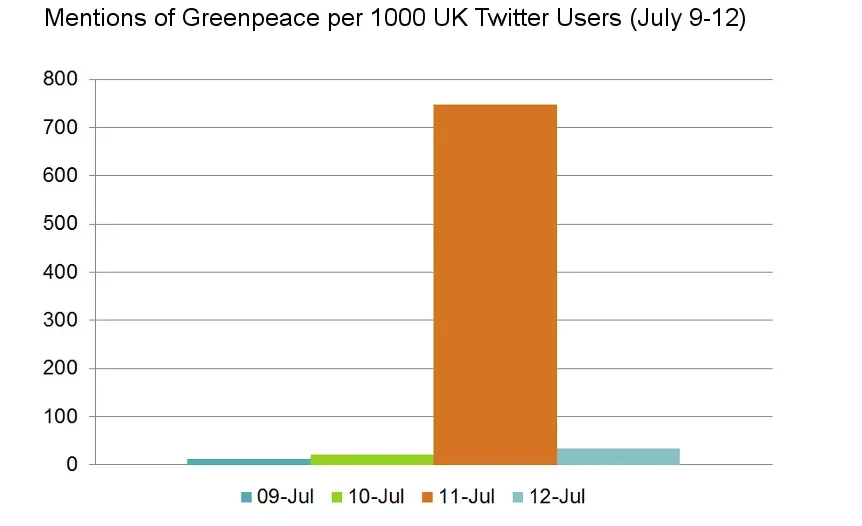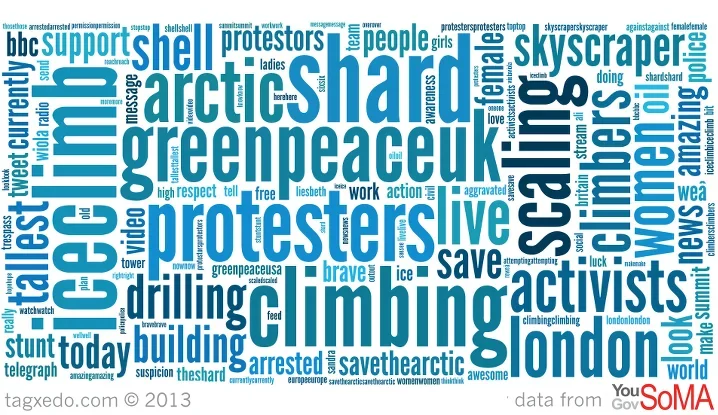More than half of all British adults heard something about the six Greenpeace activists who climbed the Shard in London – although the nation is split on the issue of drilling in the Arctic
On Thursday a group of six activists from Greenpeace scaled Western Europe’s tallest building, London’s Shard skyscraper, in a protest against Shell’s oil and gas drilling in the Arctic. The women began their climb at 4:20am and climbed for 15 hours until they reached the top, where they were arrested. A YouGov survey conducted from the same evening to the following morning found a majority of Britons had heard something about the protest.
53% of Britons reported having heard either “a lot” (as 10% had) or “a little” (as 43% had) about the protest, while another 43% had heard “not a lot” (14%) or “nothing at all” (29%) about it.
Greenpeace streamed live video of the climbers from their “Save the Arctic” website and tracked their progress as it happened, with an explanation that one reason for the protest was to get people "talking about" the arctic drilling operations being pursued by the oil company Shell, the headquarters of which are located near the Shard.
Greenpeace on Twitter
The protest also made an impact on Twitter. According to YouGov SoMA, a social media analysis tool, on the day that Greenpeace activists attempted to scale the Shard, 748 tweets about Greenpeace were heard per 1,000 UK Twitter users. In comparison, the day before the protest only 21 tweets per 1,000 users were heard talking about the organisation.

An analysis of the words used when talking about Greenpeace appears to suggest that the dramatic setting of the protest and Greenpeace’s involvement took some precedence over the issue in question, with “shard”, “iceclimb” (the Twitter hashtag endorsed by Greenpeace was #iceclimb) and “GreenpeaceUK” mentioned most, but the word next most used was “Arctic”. “Shell” and “drilling” were also among the twenty most common words in related tweets.

Drilling in the Arctic
YouGov’s survey from 11-12 July also shows how Britons currently feel about what was at the heart of the protest – drilling for oil and natural gas in the Arctic.
On this is issue the British public is split, though many have yet to form an opinion: on balance, Britons tend to oppose companies “drilling for gas and oil supplies in the Arctic” by 32%-29%, a near tie. However an additional 28% of the public “neither support nor oppose” the drilling. Britons aged 18-24 and Lib Dem voters are the two groups most opposed to arctic drilling, by 46%-20% and 45%-26%, respectively, while Conservative voters are most supportive, with 43% in support and 18% in opposition.
In response to the protest, Shell released a statement saying the company "respect[s] the right of individuals and organisations to engage in a free and frank exchange of views" and claimed the Arctic drilling operations in question were "not new". This is not the first time Shell and Greenpeace have clashed over Arctic drilling: in February 2012 actress Lucy Lawless and seven Greenpeace activists climbed the tower of the offshore drilling ship "Noble Discoverer" and stayed there for seventy-six hours in an attempt to stop it from setting off for the Arctic.










